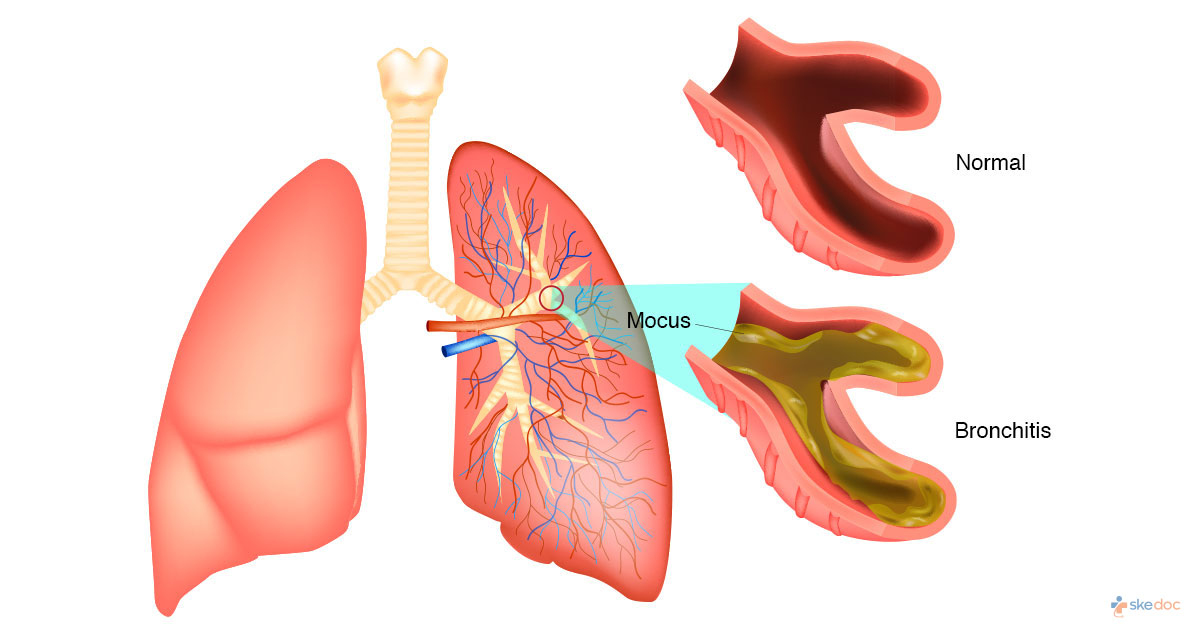Allergy
Blood Diseases
Bone & Joints
Brain
Cancer
Child Care
Cosmetic Surgery
Diabetes
Endocrinology
ENT
Eye
Gen Medicine
General Surgery
Heart
Kidney
Lifestyle
Liver & Digestive
Lung
Men’s Health
Mental health
Physiotherapy
Rheumatology
Skin and hair
Sleep Disorders
Spine
Transplant
Women Health
Thyroid
Vascular Surgery
Bronchitis

What is Bronchitis?
Bronchitis, also known as Chest Cold, is the presence of inflammation in the large and medium-sized airways called bronchi that start from the trachea and ends in the bronchioles, and carry air to and from the lungs. This inflammation may last for a few weeks or sometimes may last longer and is usually secondary to a viral infection, although some bacteria also can cause a chest cold.
Is Bronchitis a Medical emergency?
It is not a medical emergency.
Types
It may be classified as follows:
- Acute Bronchitis: This usually lasts for not more than 3 weeks.
- Chronic Bronchitis: This is a sputum producing cough that lasts for 3 months or more per year for at least 2 years.
Other types of chest cold:
- Eosinophilic Bronchitis: Chronic dry cough with increased white blood cells.
- Protracted bacterial Bronchitis: Chronic sputum producing cough seen in children.
- Plastic Bronchitis: Seen in children, and characterized by the presence of thickened mucus plugs in one lung blocking airflow, which causes the overinflation of the opposite lung.
- Aspergillus Bronchitis: The bronchi are infected by fungi, and it can even affect individuals with a normal immune system.
Causes
Acute Bronchitis is usually caused by viral infections, and sometimes by a few bacteria such as m. pneumonia, or b. pertussis.
Chronic Bronchitis is usually caused by cigarette smoking, it can also be caused by air pollution and is an occupational hazard for individuals involved with coal mining, textile production, livestock farming, chemical industries, etc.
Risk factors
The risk factors for chest cold include:
- Cigarette smoking
- Occupations that involve exposure to toxic fumes and irritants
- Weak immune system
- Acid reflux or gastroesophageal reflux disease
Symptoms & signs
The symptoms and signs of chest cold include:
- Cough
- Sputum or phlegm which may be white, yellow, grey, brown, green, or sometimes blood-tinged
- Shortness of breath
- Low-grade fever and chills
- Tiredness and the general feeling of being unwell
- Discomfort in the chest
Investigations
The following investigations may be done to help with the diagnosis and management:
- Laboratory tests:
- CBP & ESR
- Sputum culture and sensitivity: To check for the presence of any bacteria that may be present and the antibiotics that can be used to kill them.
- Chest x-ray: To evaluate the presence of possible conditions that could be responsible for cough and sputum production.
- Pulmonary function tests: To evaluate the functional capacity of the lungs.
Diagnosis
Diagnosis is based on the medical history, clinical evaluation, and the results of investigations if any.
Treatment options
The management of chest cold depends on the severity of the symptoms and whether it is acute or chronic Bronchitis. Most cases of acute Bronchitis usually resolve by themselves and do not require any medical intervention. Chronic Bronchitis may require some amount of medical management.
Medical management
The following may be used in the medical management of chest cold:
- Antibiotics/antimicrobials: May be useful in the management of chronic chest cold
- Cough syrups and expectorants
- Bronchodilators: To help in the relief of symptoms in chronic chest cold
- Systemic corticosteroids: For individuals with chronic Bronchitis who have sudden bouts of increased symptoms
- Inhaled corticosteroids: In combination with bronchodilators help to provide relief from a chronic cough
- Analgesics and antipyretics: To help provide relief from fatigue and fever
Role of diet/ Exercise/ Lifestyle changes/ Preventive measures
Some measures that can be taken to get relief from the symptoms as well as prevent acute chest cold attacks or exacerbations of chronic Bronchitis include:
- Cessation of smoking
- Wearing face masks to avoid inhalation of irritants
- Sanitizing hands and maintaining good hygiene to avoid contracting infections
- Pulmonary rehabilitation: It is useful for individuals who have a reduced lung function
Complications
Acute chest cold is usually self-limiting and there are no major complications associated with it. Chronic chest cold can impact the quality of life due to the reduced lung function that may ensue.
Prognosis
The prognosis for chest cold is generally good, especially in otherwise healthy individuals. The prognosis for chronic Bronchitis in individuals with other comorbid conditions is generally associated with a poor quality of life.
When to contact the doctor or hospital? / How to identify the emergency or complications?
It is advisable to seek medical attention if the cough persists for more than 3 weeks and is accompanied by discoloured sputum or blood, high fever, and severe breathlessness.
Indications for hospitalization if required
Hospitalization is not required.
Suggested clinical specialist/ Departments to consult for this condition
It will be attended by specialists from the department of pulmonology.
Was this article helpful?
YesNo




